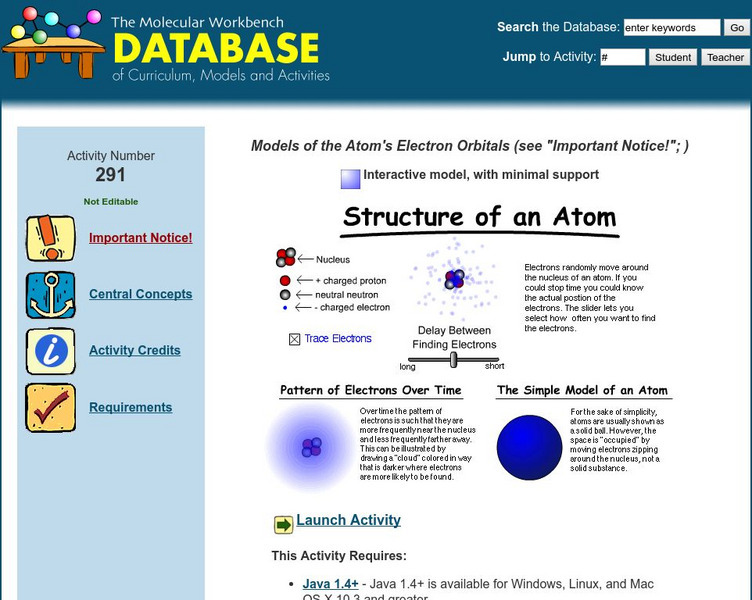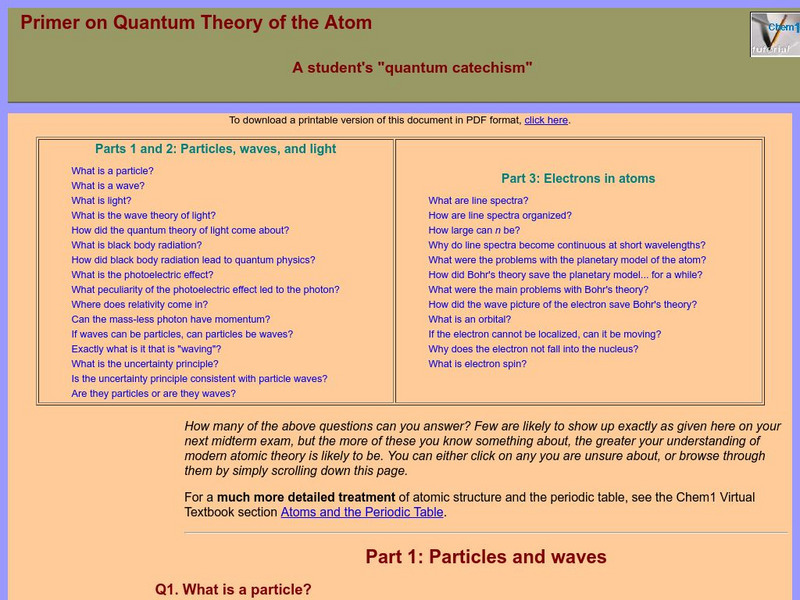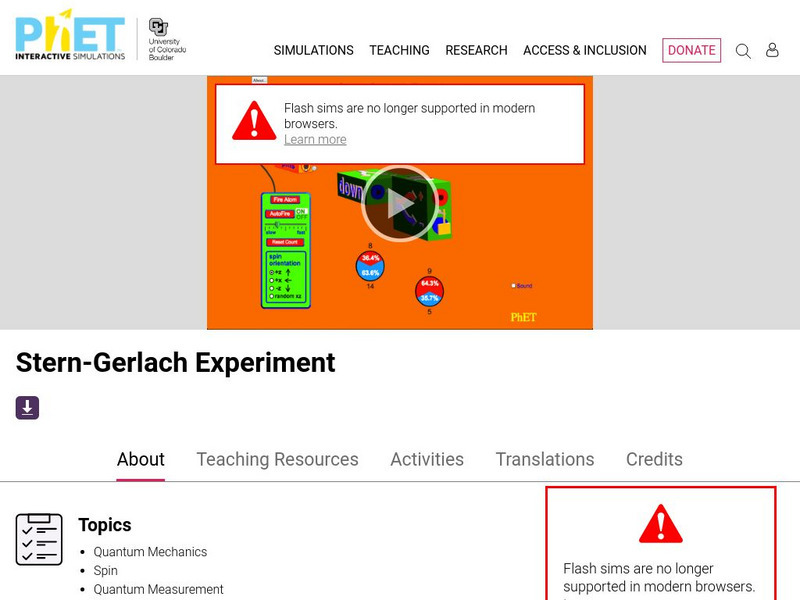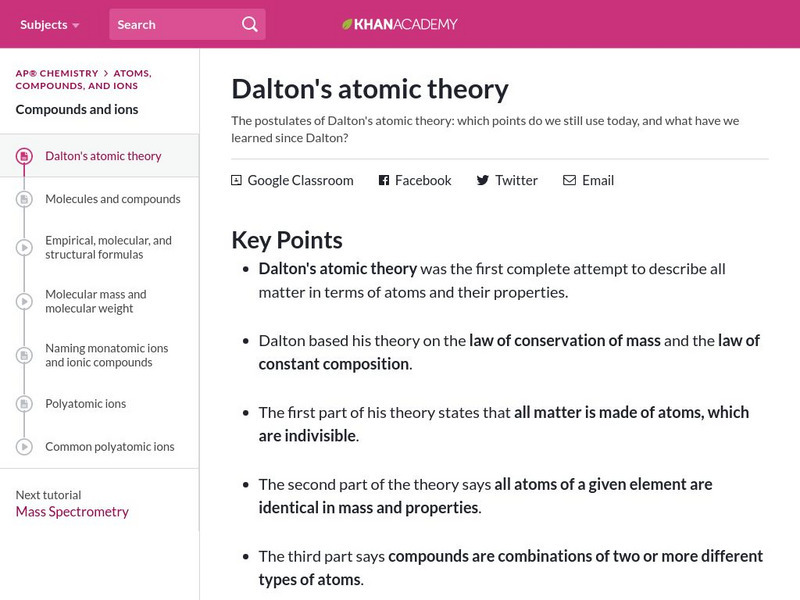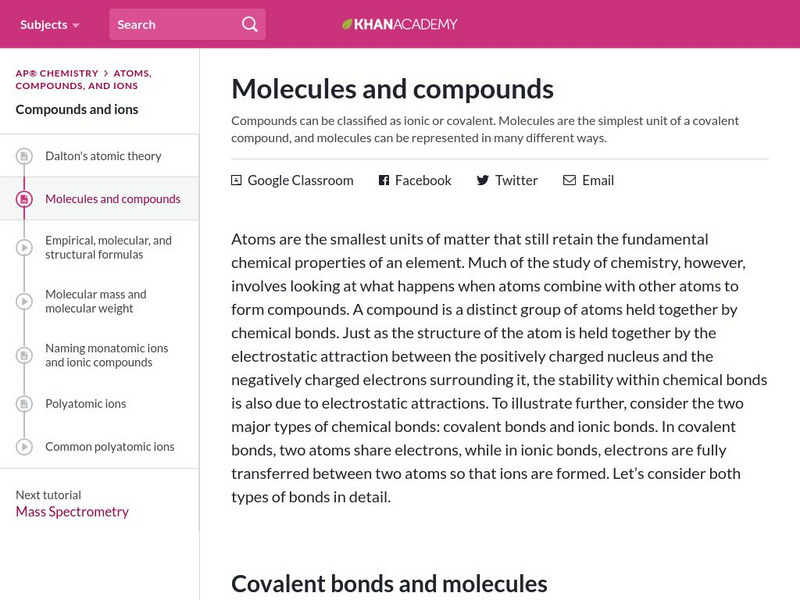Concord Consortium
The Molecular Workbench Database: Models of the Atom's Electron Orbitals
Learn about atomic structure and the multiple theories of atomic structure in this simulation.
Georgia Department of Education
Ga Virtual Learning: Physical Science: Matter and the Atom
Students investigate the structure and parts of the atom, and learn about atomic mass and atomic number. They also explore the differences among solids, liquids, gases, and plasma.
PBS
Pbs Learning Media: Periodic Table of the Elements Essay
This essay, written for Teachers' Domain, describes the foresight and pattern recognition that Russian chemist Dmitri Mendeleyev used to develop the modern periodic table of elements.
University of Colorado
University of Colorado: Ph Et Interactive Simulations: Quantum Wave Interference
When do photons, electrons, and atoms behave like particles and when do they behave like waves? In this interactive, use quantum detectors to explore how measurements change the waves and the patterns they produce on the screen.
University of Colorado
University of Colorado: Ph Et Interactive Simulations: Atomic Interactions
Explore the interactions between various combinations of two atoms. Turn on the force arrows to see either the total force acting on the atoms or the individual attractive and repulsive forces. Try the "Adjustable Attraction" atom to see...
University of Colorado
University of Colorado: Ph Et Interactive Simulations: States of Matter: Basics
After watching this simulation, students will be able to describe characteristics of the three states of matter. They will watch as atoms and molecules change between solid, liquid and gas phases.
Science Museum, London
Science Museum: Online Stuff: Atomic Firsts
Read about three famous British atomic physicists, each of whom won a Nobel Prize. J.J. Thompson discovered the electron, Ernest Rutherford successfully split an atom, and George Paget Thomson proved that electrons had wave-like properties.
Simon Fraser University
Chem1 Virtual Textbook: The Basics on Atomic Theory
As part of the Virtual Textbook, this site examines all things related to Atomic Theory including information on atoms, molecules, formulas, equations, nomenclature, and more.
Simon Fraser University
Chem1 Virtual Textbook: Primer on Quantum Theory of the Atom
Covering a range of topics related to the quantum theory of the atom, this site provides a three-part dissection of atomic theory including information on particles, waves, light, electrons, and atoms.
Ohio State University
Betha Chemistry Tutorial
This site resource offers tutorials on the gas laws, balancing chemical equations, and quantum mechanics.
University of Colorado
University of Colorado: Ph Et Interactive Simulations: University of Colorado: Build and Atom
Build an atom out of protons, neutrons, and electrons, and see how the element, charge, and mass change. Then play a game to test how the ideas work!
University of Colorado
University of Colorado: Ph Et Interactive Simulations: Atomic Interactions
Explore the interactions between various combinations of two atoms. Observe the the total force acting on the atoms or the individual attractive and repulsive forces. Customize the attraction to see how changing the atomic diameter and...
University of Colorado
University of Colorado: Ph Et Interactive Simulations: Stern Gerlach Experiment
An interactive simulation that teaches about quantum mechanics, spin, and quantum measurement through a classic Stern-Gerlach Experiment. By observing the spin of atoms as an intrinsic angular momentum, students learn to measure to reach...
Other
Institute of Physics: Practical Physics
Access hundreds of teacher-tested, practical physics lessons on this well-organized, illustrated site. Find just the right demonstration, attention-grabber, or lab for any physics teaching objective at your fingertips.
Boise State University
Boise State University: Atoms: A Virtual Field Trip Through Time and Space
Learn about the models of the atom that have been proposed throughout history. Presents Democritus, John Dalton, J.J. Thomson, Ernest Rutherford, Niels Bohr, and the modern theory of the atom. Sections are accompanied by journal...
CK-12 Foundation
Ck 12: Structure of the Atom
[Free Registration/Login may be required to access all resource tools.] Students learn about the important discoveries of subatomic particles, and how they led to our current understanding of the atom.
CK-12 Foundation
Ck 12: The Mole Concept
[Free Registration/Login may be required to access all resource tools.] In this learning module, students investigate the mole concept, and learn three ways scientists to quantify things as tiny as atoms.
University of Colorado
University of Colorado: Ph Et Interactive Simulations: Build an Atom
Build an atom out of protons, neutrons, and electrons, and see how the element, charge, and mass change. Then play a game to test your ideas!
Khan Academy
Khan Academy: Dalton's Atomic Theory
Resource investigates the beliefs of Dalton's atomic theory which consists of four parts. Which points do we still use today, and what have we learned since Dalton?
Khan Academy
Khan Academy: Molecules and Compounds
Article defines and explains compounds which are either ionic or covalent and molecules which are the simplest unit of a covalent compound. Molecules can be represented in many different ways.
Khan Academy
Khan Academy: Dalton's Atomic Theory
Article explores the key points of Dalton's atomic theory and the laws of conservation of mass and constant composition. Which points do we still use today?
Khan Academy
Khan Academy: Biology: Chemistry of Life: Matter, Elements, and Atoms
Did you know matter is made up of atoms? In this article learn about the smallest unit of matter called the atom.
Khan Academy
Khan Academy: Biology: Chemistry of Life: Atomic Number,atomic Mass,and Isotopes
Learn the fundamental properties of atoms in this article. Understand the definition of atomic number, atomic mass, and isotopes. [6 min, 50 sec]
American Chemical Society
American Chemical Society: Hompage
ChemCenter, available from the American Chemical Society, provides chemistry news, reference sources and other public services.
